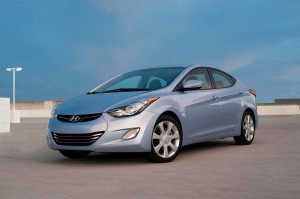
Hyundai products, like the new Elantra, appear well-positioned to pick up sales from struggling Japanese brands.
The shortage of key Japanese products, such as the Toyota Prius and Honda Civic, appears to be having a big impact on the established automotive order.
After years as an also-ran in the compact market, for example, Chevrolet’s new Cruze has been outselling traditional segment leaders Civic and Toyota Corolla. Meanwhile, Hyundai can barely keep up with demand for its own new compact, the Elantra, which has seen sales more than double over the last year.
While company officials seem loathe to be seen as taking advantage of the devastating earthquake and tsunami that struck Japan on March 11, crippling that nation’s auto industry, analysts believe that the Korean maker is particularly well-positioned to benefit from the disaster.
“The Koreans are clearly in the best position” to benefit , suggested analyst David Sullivan, of the research and consulting firm AutoPacific, Inc.
But just how much Hyundai is gaining at the expense of Japanese makers like Toyota, Honda and Nissan depends on how you read the numbers, cautions Hyundai Motor America’s marketing chief Mike O’Brien.
There’s no question the figures are trending in Hyundai’s direction. The maker’s market share has surged in recent months to 5.6% from 4.9% for all of 2010. And, when you exclude less profitable fleet business, Hyundai hit 6.4% in May, up from just a 2.5% retail share as recently as the first quarter of 2008. The maker’s sales reached a record 538,228 in 2010, and, “We can safely say we’ll exceed 600,000 this year,” predicted O’Brien.
The question is where that new business is coming from, and O’Brien points to “some customers that would normally be very loyal to (Japanese) products.” But he cautions there has not been the wholesale migration that some industry analysts had forecast as a result of the quake-generated shortages.
In fact, the brand Hyundai is taking the most business away from, according to its research, is Ford, former owners of the domestic maker’s products generating 8.6% of Hyundai’s May sales. Second on the list, however, was Nissan. In January, prior to the quake, 5.2% of Hyundai buyers traded in a Nissan, a figure that grew to 7.6% in May, when shortages began to be felt most extensively.
But the “conquest” rate actually fell in May when it came to winning over Honda buyers, O’Brien cautioned during a Hyundai news conference, stressing, “It doesn’t appear we’re getting a big benefit from the earthquake and tsunami.”
But the marketing executive cautiously revised that statement in a later conversation with TheDetroitBureau.com.
The most loyal Japanese buyers appear to be holding on, waiting, if necessary, until their dealers rebuild their inventories. But “the areas of biggest gain” for Hyundai is with what are the automotive equivalent of independent voters. Traditionally, the Japanese have done a very good job of winning over young and first-time buyers who haven’t yet formed brand loyalties.
Preliminary data suggest that a significant number of those customers aren’t willing to wait. So, if Toyota, Nissan or Honda dealers don’t have something in stock, they’ll go elsewhere – in many instances, to Hyundai.
And it’s not just product shortages working to the Korean maker’s advantage, O’Brien suggests. Despite the headlines, there are abundant supplies of some traditionally popular Japanese models – notably including the Toyota Corolla and Honda Civic, suggesting those brands may be losing traction with Gen-X and Gen-Y.
“Hyundai may not be drawing from Toyota loyalists, but it is picking up business from the non-loyalists the big Japanese brands desperately need,” emphasized Aaron Bragman, an analyst with IHS Automotive. “These are the younger buyers who will be important to a brand not just in the next four months or four years, but over the next 40” as they build their own brand loyalties.
How much Hyundai stands to benefit remains to be seen and is at least partially dependent upon its own production plans, added analyst Sullivan. Demand for the new Elantra is so intense the maker simply can’t keep up, he noted, adding that were Hyundai able to build still more it might even start drawing in more of those traditional Japanese loyalists.
